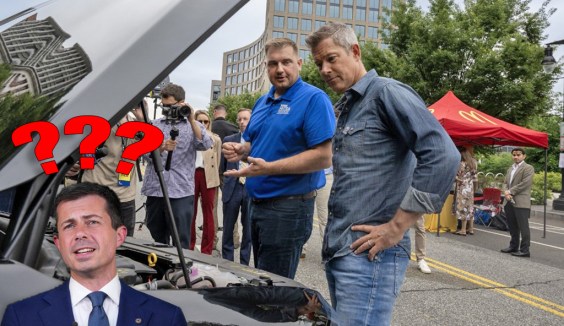With the White House's agenda crowded by high-profile debates that remain unresolved after lengthy talks with Congress -- think health care, financial regulation, even unemployment benefits -- only a handful of lawmakers are publicly engaging with the dominant issues surrounding the next long-term federal transportation bill.
 (Photo: UVA)
(Photo: UVA)Within that group of lawmakers, however, there is palpable agreement that Washington needs to look at distributing its limited supply of infrastructure money based on measurable standards which would hold states and cities accountable for their decisions. The stimulus law's elevation of "shovel-readiness" above all other criteria for funding, in other words, looks poised to give way to a more balanced method of determining which projects get funded.
Of course, adopting broad standards for federal transportation spending is far easier said than done. At a Bipartisan Policy Center (BPC) event yesterday, current and former members of Congress reckoned with the challenge.
Perhaps the boldest suggestion of the day came from Sen. Tom Carper (D-DE), sponsor of the so-called "CLEAN TEA" proposal to guarantee clean transport a share of revenue from cap-and-trade climate legislation. Carper wondered whether the nation's mounting deficits make the case for replacing the formula-based system of federal transport spending with a set of goals that would determine which projects get funded.
Carper's four proposed goals were congestion relief, safety, air quality, and job creation, a list that resembles the "metrics" offered by the BPC in its June framework for transportation reform.
One of Carper's GOP colleagues, Sen. George Voinovich (OH), pronounced the concept "wonderful" as the BPC audience looked on. Voinovich described the House legislation offered in June by transportation committee chairman Jim Oberstar (D-MN) as a major step towards a more accountable system, though some reform groups have questioned that bill's decision to let states and localities set their own transportation goals -- allowing a lot of wiggle room to develop.
Oberstar's measure does go a long way towards eliminating the political jockeying that often sets the course of federal infrastructure investment, consolidating more than 100 existing formula-based transportation programs into four: one focused on repair, one on air quality, one on safety, and a general pot of money that could be used on roads or transit.
The notion of eliminating formulas outright would almost certainly silence the complaints of states that push every few years for a guaranteed "rate of return" on their federal gas tax payments, and it would appeal to voters who are frustrated with the federal system's often-bloated bureaucracy and pro-road bias.
But regardless of its merits, the concept of ending formula-based spending would have next to no chance of winning approval in a Congress where bringing transportation dollars home can make the difference between re-election and defeat. And it's worth asking whether it would ultimately produce a more efficient American transportation system.
Metrics such as safety and air quality would have to be measured and evaluated in order to determine how much federal money states would win or lose, and lawmakers have yet to entertain the difficult questions of how such a process would work. State DOTs would likely play a central role, despite the pervasive distrust that exists between reformers and many sitting officials.
In many ways, a basic but complex question continues to confront infrastructure policymakers. Former Sen. Slade Gorton (R-WA), an author of the BPC transport framework, summed it up yesterday:
What is the purpose of federal transportation policy, and how do we measure whether that purpose has been accomplished?





